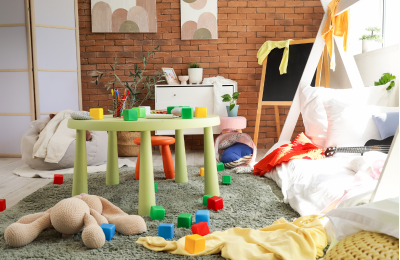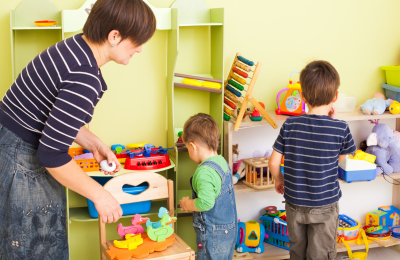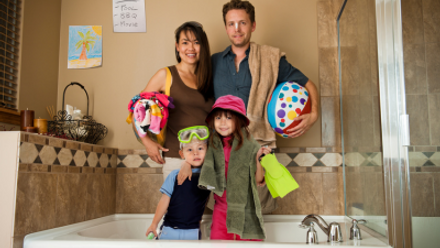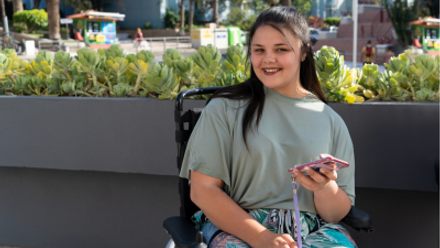Supporting Children to Build Lifelong Organising Skills
Why “Tidy Your Room!” Isn’t Enough
5 minute read
We all know the benefits of a clutter-free home: less visual noise, better air flow and fewer frantic searches for keys or homework. It’s easier to focus, easier to breathe and easier to get out the door on time. But for children, clutter isn’t just inconvenient. It can genuinely impact learning, emotional regulation and development.
APDO member Kat Band shares her experience and knowledge of organising as a child and suggests gentle strategies to enable children to manage their time, make decisions and organise their environment.
It’s easy for our homes to start resembling toy superstores. No judgement here - I’m a parent too and know the challenge all too well. But research shows that fewer toys actually increases imaginative play and creativity. More stuff doesn’t mean more fun. It often means more chaos, more overwhelm and more stress for everyone.
Back in the Day…

When I was a child, I shared a bedroom with one of my older sisters. Two sets of belongings meant double the mess potential - and we more than exceeded that potential on several occasions. The tipping point for our parents was usually when you couldn’t see a single patch of carpet and crossing the room resembled the assault course from The Krypton Factor.
With a strongly worded “Tidy your room!” and the threat of no TV, my sibling and I would frantically shovel everything - clothes, toys, broken board games and all manner of mysterious bits - into a large wooden trunk. It would then take weeks to separate things out and find the missing library books and homework, increasing stress levels in our already busy household of two full-time working adults, four children and the best part of a small petting zoo.
We weren’t being lazy or defiant. We just didn’t know how to organise our things or maintain our space. Organisation isn’t innate, it’s learned. Children aren’t born knowing how to categorise or manage belongings. These are part of what we call “executive functioning skills” and, just like riding a bike, they’re developed through experience, practice and plenty of cheerleading.
What Is Executive Functioning - and Why Does It Matter?
Executive functioning is the brain’s management system - the CEO of our minds. It helps us plan, prioritise, regulate emotions and break tasks into steps. The frontal lobe, which governs these skills, is the last part of the brain to fully develop, often not until our mid-20s.
Why does this matter? Because even late teens and young adults are still learning how to manage time, make decisions and organise their environments. For neurodivergent children - especially those with ADHD - this development is more complex still. Supporting children to care for their spaces isn’t just helpful: it’s essential for building lifelong skills and confidence.
How to Get Started
Now that we know clutter isn’t helpful and that children need support to learn how to tidy and organise, we can begin to explore some practical steps. But first, let’s address the elephant in the room.
Some days, it’s just easier and quicker to put your child’s socks away yourself. I get it. I love a curated, aesthetically pleasing space too. But the temptation to swoop in and do everything can unintentionally send the message that “you can’t do this” or “you need an adult to manage your things”. Instead, aim to start young (18 months is great, but it’s never too late!), focus on small steps and prioritise function over Pinterest perfection.
Gentle, Sustainable Strategies
Here are some practical ways to support your child’s organising skills, without pressure or perfectionism:

1. Make Tidying Part of the Activity
Treat “putting away” as a natural part of play. Use songs or countdowns to signal tidy-up time. Keep storage accessible - low shelves or cube units work well - and use broad categories with clear labels (pictures, colours or words). This helps children understand that caring for their things is part of using them.
2. Talk About the Why
If tidying feels like punishment, resistance is natural. Instead, be curious. Ask how your child feels about their space. You might discover they love their room but can’t find a place to read or feel overwhelmed by the toy pile-up.
Frame organising as a way to make space for what they love. Whether that’s building, reading or simply finding their favourite toy more easily. Avoid shaming language. Instead of calling mess “bad”, explore what’s working and what’s not.
3. Create Simple Systems
Children thrive with clear, consistent structures. Try:
- Zones for play, reading, homework and clothing.
- Containers that define limits, e.g. “everything must fit in this box”.
- A five-minute tidy before dinner or bedtime.
- Celebrating effort, not perfection - praise the act of putting pens away, even if they’re upside down!
A friend of mine uses a “family playlist” every Saturday morning. Everyone tackles an area for 30 minutes, then stops and gets on with their day. It’s simple, consistent and involves everyone.
4. Adapt for Neurodivergent Children
If you live in a neurodivergent household as I do, traditional methods may not work. Consider:
- Clear or see-through storage - if they can’t see it, it no longer exists.
- One- or two-step instructions, instead of “tidy your room”.
- Visual charts or “now and next” boards to support transitions.
- Body-doubling - being present while they tidy. This is the single most effective step I use with my daughter and with children I work with. It supports task initiation, focus and positive energy. It’s a game-changer.
- Expecting change - systems may lose effectiveness over time. That’s normal. Be flexible and experiment.

5. Involve Children in Decluttering
It’s tempting to declutter solo, especially when speed is needed. But involving children builds trust and autonomy. Try:
- Starting when your child is calm and well-rested.
- Focusing on one category for 5–10 minutes.
- Beginning with easy wins - broken toys or outgrown clothes.
- Offering choices: “Keep, pass on or store for later?”
- Creating a buffer - pack uncertain items away for a few weeks. Toy rotation can reduce clutter without permanent loss.
Let your child lead. If they want to keep the party bag toy, let them! If they’re ready to let something go, support it. And if you’re not ready to part with an item they’ve chosen, quietly hold onto it yourself. Respecting their decisions promotes trust, confidence and safety.
In conclusion
Supporting children to organise isn’t about enforcing tidiness - although that’s a helpful side effect. It’s about nurturing skills, autonomy and emotional safety. Start small, aim for progress not perfection and celebrate progress. You’re not just helping them tidy a room, you’re genuinely helping them build foundations for life.






